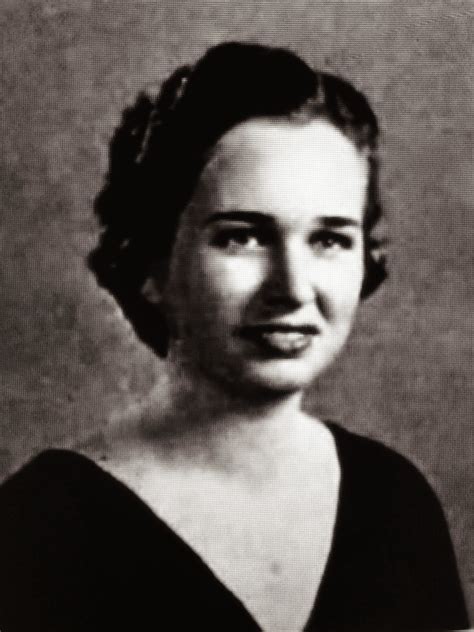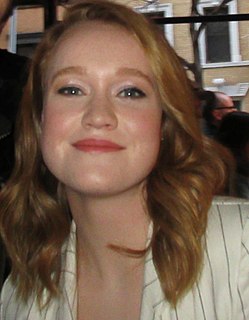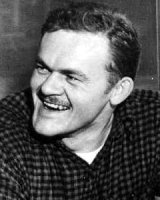A Quote by Jim Cummings
I've done so many other projects where you're in a room with a reader and you're acting your lines out: 'We have to get out of here! Any minute the building will explode!' And then the reader says: "Yes...we have to get... out of here." So it's not easy to be in the moment in that kind of situation. Reading with the entire cast in the room for The Clone Wars makes the experience much more organic and I love that.
Related Quotes
Pain is like a new room in your house that you never knew you had. If you had known, you would have bolted and locked the room past any entering. But truly, it is a room like any other, four glaring white walls and a dark hard floor, and if you don't try to get out, it is possible to remain in it. Once you tried to get out, you ... couldn't ... stand ... it. Don't think of getting out.
The narrative image has more dimensions than the painted image - literature is more complex than painting. Initially, this complexity represents a disadvantage, because the reader has to concentrate much more than when they're looking at a canvas. It gives the author, on the other hand, the opportunity to feel like a creator: they can offer their readers a world in which there's room for everyone, as every reader has their own reading and vision.
The main thing I try to do is write as clearly as I can. Because I have the greatest respect for the reader, and if he's going to the trouble of reading what I've written -- I'm a slow reader myself and I guess most people are -- why, the least I can do is make it as easy as possible for him to find out what I'm trying to say, trying to get at. I rewrite a good deal to make it clear.
We should, I believe, beware of the pitfalls described by Taine: 'Imagine a man who sets out on a voyage equipped with a pair of spectacles that magnify things to an extraordinary degree. A hair on his hand, a spot on the tablecloth, the shifting fold of a coat, all will attract his attention; at this rate, he will not go far, he will spend his day taking six steps and will never get out of his room.' We have to get out of this room.
I actually dislike, more than many people, working through literary allusion. I just feel that there's something a bit snobbish or elitist about that. I don't like it as a reader, when I'm reading something. It's not just the elitism of it; it jolts me out of the mode in which I'm reading. I've immersed myself in the world and then when the light goes on I'm supposed to be making some kind of literary comparison to another text. I find I'm pulled out of my kind of fictional world, I'm asked to use my brain in a different kind of way. I don't like that.
I think a play can do almost anything, because it's also a static form, much more so than in a movie. In a movie you can move the scenery, you can do anything any way. A cartoon, happens in a limited amount of space and a limited amount of time, and you can only get so many words before the reader's gonna get impatient. All of these forms that I enjoy are in a sense a slight of hand, where you have to suggest much more than you really show. You have to, in a sense, seduce the reader and trick the reader or the audience into going with you.
In any of the big acting cities, there are breakdowns that the casting directors put together for the projects that they're working on and then they get sent out to the agents and stuff like that. It's difficult to find projects, sometimes, unless your agent or manager is submitting you for those specific projects.
You've got to be a good reader. So whatever genre that you're interested in, read a lot of books about it and it's better than any kind of writing class you'll ever take. You will absorb techniques and then in a lot of cases you can just start writing using the style of the book or the author that you admire and then your own style will emerge out of that. Be a diligent reader and then try to write seriously, professionally and approach everything in writing in a professional way.
Acting is many things. Acting is playing lines, of course, but it's much more profound than that. Acting is truth-telling and trying to find the truth in a human situation, which will be sketched out by a screenwriter with all the skill that a screenwriter can do; but in the end, that's just the map of the journey.
In the theater, you're so much more in charge as an actor. For better or for worse, you know what the audience is seeing. But you can be acting your socks off on film, and then you see the movie, and the camera is on the other actor, or they've cut out the lines you thought were significant, or they've adjusted the plot. So much of it is out of your control.
Other memories stick, no matter how much you wish they wouldn’t. They’re like a song you hate but can’t ever get completely out of your head, and this song becomes the background noise of your entire life, snippets of lyrics and lines of music floating up and then receding, a crazy kind of tide that never stops.
Choose Life over the other stuff. Get out of your head. Live. Dress up. Eat. Touch people. Help out. Give up. Love people. Give your best away. There’s more. What’s the problem? Relax. You’re going to die. Throw a party. Eat off my plate. Sing to me. Meet me in the bedroom. Get a massage. Give one. Let your amazement out into the room. Pry open the box you hide your joy in. Be a poem.




































